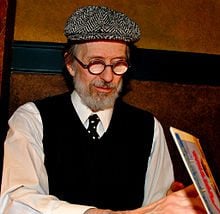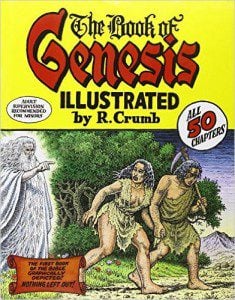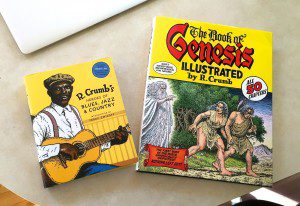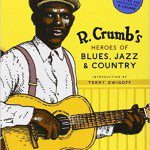
Does Robert Crumb hate you?
I’ve used the word hate pretty liberally throughout my review. I’m not the first person to note that hate seems to animate Crumb’s work. Here’s an article to document that: http://observer.com/2015/10/robert-crumb-hates-you/ (Warning: adult language and themes!)
At times Crumb is accused of misogyny, but what he’s really is a misanthrope. Women are actually some of his favorite people–he just hates them less than everybody else. (His own words, by the way.) I don’t take him too seriously, still there’s no denying he hates a lot of people.
But is there a place for hate in our lives? Is it always wrong? Could Crumb’s hatreds be justified?
I think there is a place for hate. Scripture tells us so (Ecclesiastes. 3:8) Aristotle agreed.
To put hatred in its place though it must have a legitimate end, or purpose, as well as a legitimate origin. If hatred is the child of anger, and anger is a bastard child of injustice, then hatred has a place in our lives. But what we do about it still needs working out.
Are the things that make us angry always unjust though? If it were so, anytime we saw anger it would be a simple matter of just tracing things back to the source and we’d be able to finger injustice every time.
But it’s not so simple. When we are unjust, disordered somehow, as Plato describes in The Republic, then our emotions will be misdirected. We may even find ourselves angered by justice and hateful of legitimate authority when it frustrates us.
Sorting it all out is tough to do, tedious even, like separating the wheat and the chaff with tweezers. I’m a mixed bag of legitimate and illegitimate anger, legitimate and illegitimate hatreds. And so are you.
But one of the worst things that can happen to us is being blinded by our anger and our hatreds. I know I suffer from bouts of blindness, but I only know that because I get over them. There are probably some things I’m permanently blind to. And I wouldn’t even know. After all, if I could see that, I wouldn’t be blind.

Blind to God
Crumb doesn’t see God in the book of Genesis. He’s up front about that. In his introduction he declares himself. The Bible is a thoroughly human book for Crumb. And it appears that this presupposition was never challenged by his reading.
Crumb’s conviction is broadly shared today. On rare occasion a person will change his mind after reading the Bible. But usually prejudices are only reinforced. It is amusing to see a transformation in some cases as the reason for rejecting the Bible moves from one extreme to another. I’ve know people who won’t read it because they believe it is all plaster saints and greeting card material. Then they read it for some reason and they’re horrified to see really messed up people doing all sorts of untoward things. Then they reject it as the product of barbarism. So it is either too sweet or it is too dark and disturbing. (I am reminded of Jesus and the Pharisees here–“John comes along in a hair shirt and you say he has a demon; I come along and you call me a drunk; there’s no pleasing you people.” Wiley paraphrase, if you hadn’t guessed.)
But what these people miss is the point.
The world is a messed up place, that’s a given in the Bible. But there is enough order to things for us to infer that there is a Creator, that’s also a given in the Bible. Amazingly, theism seems to be the natural starting point for people. Then someone comes along to talk us out of it. I’ve even come across transhumanist types who believe this penchant for seeing purpose in things is a kind of birth defect that we should have corrected either by the public schools, or even by a medical procedure.
While the Bible begins with God, it deals honestly with the world as it is. The Bible doesn’t bowdlerize things in order to make God easier to believe in. What the Bible records is God’s work in our messed up world. And if you tend to reject divine agency in your life, or in the world at large, you probably won’t see it in the Bible either, even when the Bible directly attributes some act or statement to God. You’ll just turn to some human explanation. That’s what Crumb does.
Genesis 15
Let’s go back to Genesis 15. This is where I’ll end, because I think it is here that we see Crumb’s blindness most clearly.
First of all, Crumb doesn’t even dignify the chapter with an endnote. When we look at his artistic treatment, not only do we see the faux pas I mentioned in my last post, the layout misses the significance of the theophany. The largest frame is given to the darkness that descends on Abram just before the appearance of the torch and pot. When they do appear, the framing of that part of the story is just another in a sequence. Nothing in Crumb’s treatment indicates that something of great importance is happening.

A little background on covenants would be helpful here.
Most westerners today live in the bubble called “the welfare state”. We take a great deal for granted in the bubble. And because of that we find it almost impossible to enter sympathetically into a world that cuts animals in half for political purposes.
When a covenant was made it was cut. The Hebrew ” karat berit”, means, “to cut a covenant”. When you live in a world with few natural borders and is also subject to blight, plague, and drought, among many other unpleasant things, you need friends. And when you also remember that there were no cell phones, hospitals, grocery stores, or even reliable police protection, you need more than friends, you need allies who will come to your aid in your hour of need.
Covenants helped to secure those alliances. Because we’re talking about life and death here, the rite used to seal the deal needed to be equally serious. Covenants were that. They were blood oaths, entered into by household heads as representatives of clans and extend families. (Ooo, that evil patriarchy again!)
Anyway, what would happen is this: animals would be cut in two and laid along side each other. Then the heads of house would make their promises before many witnesses. Then they would walk the bloody way, saying by doing so, “If my house fails to keep its promises to your house, you may take blood vengeance upon us.” Then there would be a big celebration. The animals would then be roasted and eaten by everyone present.
I know, barbaric. But remember, you live in a bubble. And, by the way, we still need men who can do the hard things we don’t like to think about. We just let them do those things out of sight–outside the bubble.
Now think about this: if God is not only the creator, but also the source of life, then to be cut off from him is death itself. What better image can you imagine for getting that hard truth across than the covenant rite of the ancient near east? I can’t think of one.
Crumb misses all this, of course. And most people these days do too.
But because he missed that, he also missed that fact that in God’s covenant with Abram, the signs of God’s presence pass through the halves, but Abram does not.
Stop.
What we have here is a revelation. The Lord promises to Abram that he will care for Abram, that he will protect him and his household, and that he will bless him with a blessing that will spill over the edges of his household to bless every family on earth (see Genesis 12 for that part). And God will make this happen without any qualification. Whether Abram can manage to do what he should do or not will not keep the Lord from keeping his part of the deal.
I suspect Bob Crumb missed all of that. I find no evidence in his book that he saw it. I can say for certain he failed to see that Abram’s covenant is the very heart, not only of Genesis, but of the whole Bible.
That’s really too bad. Because if you can’t see that, you’ve missed God.












